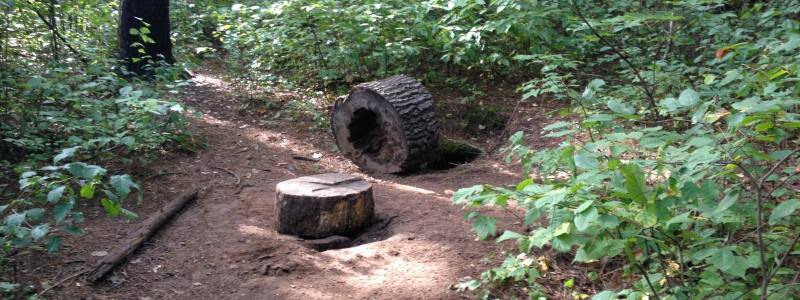
Introduction:
In case you were unaware, Wolf Patrol was founded by animal activist Rod Coronado, and is comprised and supported by concerned citizens who care about wildlife in the Great Lakes region, with a focus on gray wolves. They see the slaughter of wolves as an unnecessary evil, one that interferes with biodiversity on our public lands; with wolves being a keystone species that keeps prey species strong and viable.
They take it upon themselves to legally monitor hunters out in the field and document wildlife policy as they see it unfold. As a result, they depend on public outreach and cooperation with state wildlife agencies to enforce change and keep wolves protected, all the while, keeping dialogue open between hunters and themselves.
Interview:
While enjoying a beautiful campfire in the north woods I had the opportunity to ask Rod about the current whereabouts of Wolf Patrol and why they were out there. He told that me that they were monitoring the hound hunt for black bear in northern Wisconsin with a primary focus on the Chequamegon-Nicolet National Forest. It may surprise some followers that Wolf Patrol is monitoring a bear hunt when then they are fighting for wolves, but there’s a good reason for that.
Coronado stated, “Even though bears are not the primary focus, when you promote healthy ecosystems and biodiversity, you quickly learn that everything is connected.” He explained that even though wolves have returned to a federally protected status, other hunting practices continue to threaten Wisconsin’s wolves. For example, it’s legal to feed bears as a way to condition them to return to a hunter’s bait site, and as a result other wildlife frequent these sites- raccoons, ravens, deer, and of course, wolves. As result, wolves are attracted to these sites, and when hunters release their dogs, wolves in turn kill them as a means of protecting their families. Ironically residents might not realize that hunters get compensated monetarily from the Endangered Species Fund- the very fund created when Wisconsinites purchase an endangered species plate.
What is Wolf Patrol hoping to accomplish?
“We want to see bear baiting and hound hunting banned in the Chequamegon-Nicolet National Forest. We think that is being extremely reasonable, as it still leaves state and county public lands available for these hunters to molest. Most every other national forest in this great country of ours prohibits the feeding of bears. I see signs all over the west that say, “A Fed Bear is a Dead Bear” because once bears become conditioned to human food, guess what? They become a threat to humans as well.”Do you feel like you’re accomplishing what you’re setting out to do?
“No, we haven’t accomplished what we want now, but the end could be
near if citizens upset over such horrible practices such as bear baiting
speak out against it by flooding the U.S. Forest Service with public
comments requesting an end to such practices. The district ranger in
this area is not the enemy, she’s our ally. It’s just that there’s a
legal process to make changes to management practices, and she needs to
be able to represent to her superiors that this is not a special
interest issue, but one that the majority of public land users are in
support of.”
Are you noticing a difference between the attitudes of bear hounders and wolf hunters, or are they basically one in the same?
“Wolf hunters are a special breed. Most hunters I talk to, have no problem with wolves, because they recognize that predators are a natural part of the landscape, and there’s plenty of deer to go around. But a lot of wolf hunters hate wolves because they claim that “they are killing all the deer.” But the science is on the wolves side and they account for less than six percent of the annual deer “harvest”, while humans with hunting and automobiles account for about 25% of the total deer population. So, we can talk about wolves killing too many deer after we ban hunting and driving!”
“Bear hunters come in all sizes and shapes, some like a gentleman who reached out to me recently, has no problem with wolves, but believes they do need to be managed. While others are digging their feet into the sand to defend the practice of bear baiting and hound hunting, simply with the argument that they’ve been doing it for generations. Well, guess what? You know what else people did for generations? Own slaves, kill Indians and deny women equal rights. The question is do we as a society want to evolve, or do we want to preserve a practice that we now know threatens and harms much of the landscape?”
“Wolf hunters are a special breed. Most hunters I talk to, have no problem with wolves, because they recognize that predators are a natural part of the landscape, and there’s plenty of deer to go around. But a lot of wolf hunters hate wolves because they claim that “they are killing all the deer.” But the science is on the wolves side and they account for less than six percent of the annual deer “harvest”, while humans with hunting and automobiles account for about 25% of the total deer population. So, we can talk about wolves killing too many deer after we ban hunting and driving!”
“Bear hunters come in all sizes and shapes, some like a gentleman who reached out to me recently, has no problem with wolves, but believes they do need to be managed. While others are digging their feet into the sand to defend the practice of bear baiting and hound hunting, simply with the argument that they’ve been doing it for generations. Well, guess what? You know what else people did for generations? Own slaves, kill Indians and deny women equal rights. The question is do we as a society want to evolve, or do we want to preserve a practice that we now know threatens and harms much of the landscape?”
Any upcoming plans for Wolf Patrol in the near future?
“We will be monitoring the hound hunt for bear in Wisconsin until the
season closes in early October. Then we will be present in Wisconsin
throughout the Fall, but I can’t tell you doing what because we now see
ourselves as a quasi-law-enforcement agency, and revealing our
strategies will just alert hunters who threaten wolves, to our
intentions. This isn’t just our perspective, last week I spoke to the
DNR’s Chief Conservation Officer, and he has no problem with our
mission, as it gives his wardens additional information on illegal
hunting activities on public lands. We also turn over evidence to the
U.S. Fish & Wildlife Service and U.S. Forest Service. We see these
agencies as allies, not enemies. It’s the poachers that need to be
looking over their shoulders more often now, as it’s not just game
wardens they need to worry about, but our cameras as well.”
Anything additional you’d like to share with our followers?
“Yes, I hold environmentalists, animal rights & welfare advocates and outdoor recreationists accountable for the mis-management of wildlife and public lands, because we’ve let hunters and trappers stack the deck by participating in the DNR’s public process while we simply whine about it. We need to get involved. Our cause cannot be advanced unless enough constituents participate in the meetings and lobby their local legislators, then the DNR can act. So I’m not saying everyone needs to be doing what we are, we also need people to support the League of Humane Voters-Wisconsin Chapter, and phone, write and visit their political representatives and tell them to ban practices that negatively impact our wildlife, because if wildlife belongs to anyone, it belongs to everyone, not just those who like to kill it.”
Stay tuned for more updates from Rod, as we follow Wolf Patrol’s efforts throughout the season!
Resources:
Wolf Patrol http://wolfpatrol.org
League of Humane Voters-Wisconsin Chapter http://www.lohvwi.org
Find your WI representatives here https://www.govtrack.us/congress/members/WI
Contact the U.S. Forest Service http://www.fs.fed.us/about-agency/contact-us
Comments for the U.S. Forest Service https://my.usgs.gov/ppgis/studio/launch/35135
“Yes, I hold environmentalists, animal rights & welfare advocates and outdoor recreationists accountable for the mis-management of wildlife and public lands, because we’ve let hunters and trappers stack the deck by participating in the DNR’s public process while we simply whine about it. We need to get involved. Our cause cannot be advanced unless enough constituents participate in the meetings and lobby their local legislators, then the DNR can act. So I’m not saying everyone needs to be doing what we are, we also need people to support the League of Humane Voters-Wisconsin Chapter, and phone, write and visit their political representatives and tell them to ban practices that negatively impact our wildlife, because if wildlife belongs to anyone, it belongs to everyone, not just those who like to kill it.”
Stay tuned for more updates from Rod, as we follow Wolf Patrol’s efforts throughout the season!
Resources:
Wolf Patrol http://wolfpatrol.org
League of Humane Voters-Wisconsin Chapter http://www.lohvwi.org
Find your WI representatives here https://www.govtrack.us/congress/members/WI
Contact the U.S. Forest Service http://www.fs.fed.us/about-agency/contact-us
Comments for the U.S. Forest Service https://my.usgs.gov/ppgis/studio/launch/35135
About Keri Lewis
source



No comments:
Post a Comment